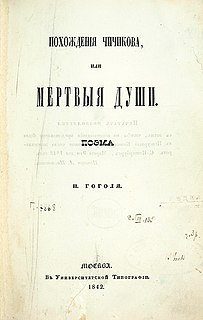
Dead Souls is a novel by Nikolai Gogol, first published in 1842, and widely regarded as an exemplar of 19th-century Russian literature. The purpose of the novel was to demonstrate the flaws and faults of the Russian mentality and character. Gogol portrayed those defects through Pavel Ivanovich Chichikov and the people whom he encounters in his endeavours. These people are typical of the Russian middle-class of the time. Gogol himself saw it as an "epic poem in prose", and within the book as a "novel in verse". Despite supposedly completing the trilogy's second part, Gogol destroyed it shortly before his death. Although the novel ends in mid-sentence, it is usually regarded as complete in the extant form.

The Government Inspector, also known as The Inspector General, is a satirical play by the Russian and Ukrainian dramatist and novelist Nikolai Gogol. Originally published in 1836, the play was revised for an 1842 edition. Based upon an anecdote allegedly recounted to Gogol by Pushkin, the play is a comedy of errors, satirizing human greed, stupidity, and the extensive political corruption of Imperial Russia.

"The Nose" is a satirical short story by Nikolai Gogol written during his time living in St. Petersburg. During this time, Gogol's works were primarily focused on surrealism and the grotesque, with a romantic twist. Written between 1835 and 1836, "The Nose" tells the story of a St. Petersburg official whose nose leaves his face and develops a life of its own. "The Nose" was originally published in The Contemporary, a literary journal owned by Alexander Pushkin. The use of a nose as the main source of conflict in the story could have been due to Gogol's own experience with an oddly shaped nose, which was often the subject of self-deprecating jokes in letters. The use of iconic landmarks in the story, as well as the sheer absurdity of the story, has made "The Nose" an important part of St. Petersburg's literary tradition.

The Fair at Sorochyntsi is a comic opera in three acts by Modest Mussorgsky, composed between 1874 and 1880 in St. Petersburg, Russia. The composer wrote the libretto, which is based on Nikolai Gogol's short story of the same name, from his early (1832) collection of Ukrainian stories Evenings on a Farm near Dikanka. The opera remained unfinished and unperformed at Mussorgsky's death in 1881.

Milovan Glišić was a Serbian writer, dramatist, translator, and literary theorist. He is sometimes referred to as the Serbian Gogol.
Marriage is a two-act play by the Russian writer Nikolai Gogol, which was written in 1832 and first published in 1842.
"Ivan Fyodorovich Shponka and His Aunt" is part of the collection Evenings on a Farm Near Dikanka by Nikolai Gogol.
Mirgorod is a collection of short stories written by Nikolai Gogol, composed between 1832-1834 and first published in 1835. It was significantly revised and expanded by Gogol for an 1842 edition of his complete works. The title Mirgorod is the Russian pronunciation of the name of the Ukrainian city Myrhorod and means "city of peace" in both languages. It is also the setting for the final story in the collection, “The Tale of How Ivan Ivanovich Quarreled with Ivan Nikiforovich”. The title reflects the stories’ portrayal of provincial Ukrainian life, similar to Gogol’s successful previous collection, Evenings on a Farm Near Dikanka. To solidify this connection between the two works, he attached the subtitle: “Stories which are a continuation of the Evenings on a Farm Near Dikanka.”
"The Carriage" is an 1836 short story by Nikolai Gogol, one of his shortest works. The story centers on the life of a former cavalry officer and landowner near a small Russian town. After reading the story, Anton Chekhov wrote to Alexei Suvorin, "What an artist he is! His 'Carriage' alone is worth two hundred thousand rubles. Sheer delight, nothing less."
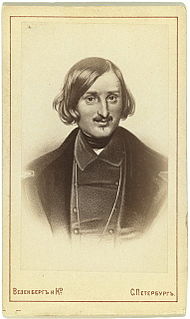
This is a list of the works by Nikolai Gogol (1809–52), followed by a list of adaptations of his works:
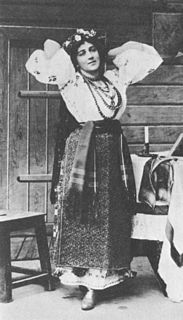
Christmas Eve, is an opera in four acts with music and libretto by Nikolai Rimsky-Korsakov. Composed between 1894 and 1895, Rimsky-Korsakov based his opera on a short story, "Christmas Eve", from Nikolai Gogol's Evenings on a Farm Near Dikanka. The story had been used as the basis for an opera at least three times previously, including for Tchaikovsky's Vakula the Smith (1874). Oliver Knussen writes that "Rimsky is only interested in recreating the atmosphere of the folk-tale, fleshing it out for his stage pageant in a comparable way to Humperdinck in Hansel. Gerald Abraham, on the other hand, praises the vivid humanity and humour of Rimsky's setting, as well as its atmospheric strength.
Mikhail Ivanovich Barsukov is a former Russian intelligence and government official. His most notable post was as the short-lived head of the Federal Security Service of the Russian Federation (FSB) in mid-1990s.

The Medal "For Impeccable Service" was a Soviet military award for long service awarded to deserving members of the military personnel of the armed forces of the USSR, of the Interior Ministry of the USSR and of the Ministry for the Protection of Public Order of the USSR, to recognise ten, fifteen and twenty years of faithful and impeccable service to the state.
It's a Family Affair-We'll Settle It Ourselves is a comedy by Alexander Ostrovsky. It was his first major work, written in 1849 and published in the No.6 1850 Moskvityanin issue. Having caused a furore, it was banned by the Imperial Theatres' censorship committee and was staged for the first time on 9 December 1860, ten years after its publication. For some time the play has been also referred to as The Bankrupt, which was its original title.
A lawsuit is a legal case.
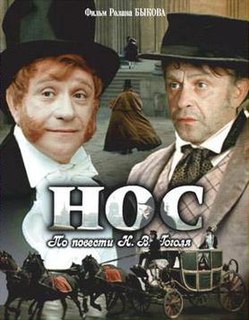
The Nose is a 1977 Soviet TV drama film, directed by Rolan Bykov based on the novel by Nikolai Gogol.
The Portrait is a forthcoming film adaptation of Nikolai Gogol’s short story The Portrait, created by fine artists, directors/screenwriters/producers Anastasia Elena Baranoff and Elena Vladimir Baranoff.
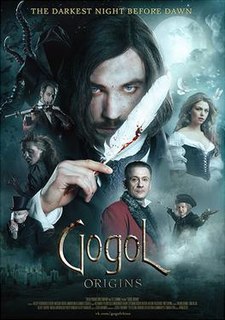
Gogol. The Beginning is a 2017 Russian fantasy-horror film directed by Yegor Baranov loosely based on works by Nikolai Gogol from the collection Evenings on a Farm near Dikanka. The title role is played by Alexander Petrov.
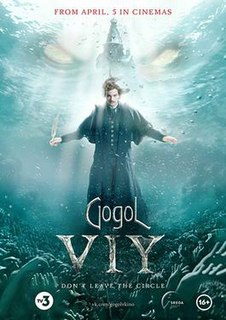
Gogol. Viy is a 2018 fantasy-horror film directed by Egor Baranov, sequel to Gogol. The Beginning.















